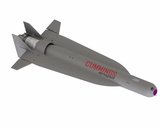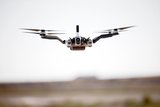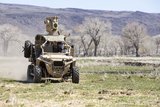Mercury Computer Systems announces $2.7 million order for Predator upgrade
Mercury Computer Systems has announced it has received a $2.7 million production order from General Atomics Aeronautical Systems to provide RACE++ Series rugged computing modules for the Predator unmanned aircraft system (UAS) Lynx Block 20 synthetic aperture radar (SAR) technology upgrade.
Since 1998, Mercury has continued to provide its scalable RACE Series and RACE++ Series computing modules and software to enable high-performance signal processing for multiple generations of GA-ASI's Lynx SAR product line.
The Lynx family of SAR reconnaissance and surveillance systems, along with Mercury's signal processing modules, are installed on a variety of Predator series UAS. As the most combat-proven unmanned aircraft system in the world, the Predator UAS provides continuous and persistent armed reconnaissance and battlefield support to ground troops.
The Lynx Block 20 radar upgrade is an extension of a production run requested by the U.S. Air Force and will bring the number of signal processing computing modules that Mercury has provided to GA-ASI to more than one thousand.
"GA-ASI's world-class family of Lynx SAR systems and Predator UAS continues to be deployed extensively on reconnaissance and surveillance missions, bringing all-weather, very-high-resolution imagery to the warfighter. The picture-quality imagery provided by the Lynx radar would not be possible without Mercury's reliable, scalable, high-performance computing modules and interconnect technology," said Brian Hoerl, Vice President of Worldwide Sales for Advanced Computing Solutions at Mercury.
"Our processor upgrades enable the Lynx radar to continue to give the warfighter leading-edge performance within the current size, weight, and power constraints of the UAS. This is yet another demonstration of how our technology road map has enabled customers to seamlessly upgrade their system performance and accelerate their embedded computing applications."
More from Uncrewed Vehicles
-
![Cummings Aerospace showcases Hellhound loitering munition designed for US Army’s LASSO programme (video)]()
Cummings Aerospace showcases Hellhound loitering munition designed for US Army’s LASSO programme (video)
Cummings Aerospace presented its turbojet-powered Hellhound loitering munition at SOF Week 2025, offering a man-portable solution aligned with the US Army’s LASSO requirements.
-
![SOF Week 2025: PDW unveils attritable FPV drone for SOF operations at scale]()
SOF Week 2025: PDW unveils attritable FPV drone for SOF operations at scale
PDW has revealed its Attritable Multirotor First Person View drone at SOF Week 2025, offering special operations forces a low-cost, rapidly deployable platform for strike and ISR missions, inspired by battlefield lessons from Ukraine.
-
![SOF Week 2025: Teledyne FLIR white paper provides guidance on reusable loitering munitions]()
SOF Week 2025: Teledyne FLIR white paper provides guidance on reusable loitering munitions
Teledyne FLIR is highlighting the emerging requirements for 'recoverable and re-usable' loitering munitions across the contemporary operating environment during this week’s SOF Week conference in Tampa, Florida.
-
![SOF Week 2025: Kraken Technology group debuts K3 Scout USV in North America]()
SOF Week 2025: Kraken Technology group debuts K3 Scout USV in North America
High-performance maritime industry player Kraken Technology Group, based in the UK, has used the SOF Week conference in Tampa, Florida this week to debut its K3 Scout uncrewed surface vessel (USV) to the North American market.
-
![Palladyne AI and Red Cat to demonstrate capabilities for autonomous drone swarms to the US military]()
Palladyne AI and Red Cat to demonstrate capabilities for autonomous drone swarms to the US military
Red Cat and Palladyne AI recently conducted a cross-platform collaborative flight involving three diverse heterogeneous drones.
-
Jammer resistant drone designs spark search for countermeasures
The Russia-Ukraine conflict has driven another stage of evolution for drones and the counter measures to defend against them.

























